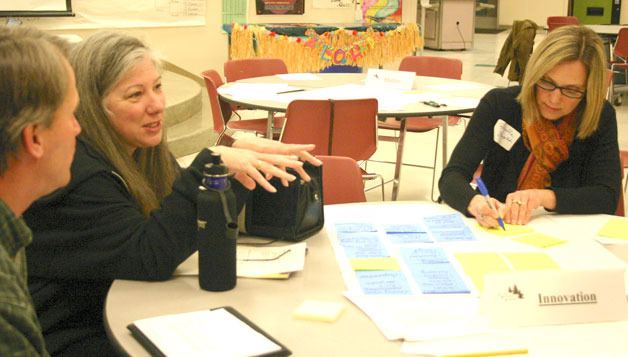LANGLEY — The New Commons at South Whidbey High School looked like a rowdy classroom.
At the front stood South Whidbey School District Superintendent Jo Moccia, reminding the crowd of its tasks, when to rotate tables and asking the assembly to be quiet and listen. At the dozen tables sat about 50 parents, teachers, school board and other community members interested in shaping the future of South Whidbey’s schools.
The second “Community Conversation” hosted by the school district was the community’s turn to speak. More than 100 ideas, questions and concerns were voiced, or rather written on adhesive notes that were stuck to poster paper and taped to the walls for everyone to review at the end of the two-hour meeting March 21.
“The idea is the conversation will get richer and richer,” Moccia said.
After the previous conversational meeting, Moccia grouped the audience’s questions into four categories: alternative programs, innovation, electives and kindergarten. The audience was asked to rotate to different tables about every 20 minutes to discuss those themes. Each table had a South Whidbey teacher to facilitate the conversation.
One audience member, a retired college professor and recent South End transplant, said the school district’s conversations were a quick way to understand the state of the schools.
“I have the big picture of what this school district is trying to do, and they take their community’s concerns seriously,” said Betty Bond, a Langley resident who moved to South Whidbey in September.
Some of the concerns among the themes were partnering with local businesses for internships and externships, defining alternative programs and how they fit into the district’s curriculum, corralling online courses and determining the effectiveness of full-day kindergarten.
In previous years, South Whidbey only offered half day kindergarten, which is fully funded by the state; full day kindergarten is not. A handful of notes on the kindergarten posters were dedicated to the benefits and negatives of an entire day of early education: Are scores better or has improvement occurred from full day (kindergarten) as compared to last year ½ (kindergarten)? Are there going to be any pre-K offerings in our district?
Jan McNeely, the elementary school’s physical education teacher, expressed concern over the preparedness of some students to enter kindergarten. There were more early entries into kindergarten than ever, said McNeely, who has taught at South Whidbey schools for more than 20 years, and those students’ attention spans are already waning with three months left in the school year.
“For me, there needs to be a better screening process for those early entry kids,” she said.
Bayview School Director David Pfeiffer was in a blend of a few of the categories, save for kindergarten. He runs the alternative school on South Whidbey that attempts non-traditional forms of teaching. Bayview School still has classrooms and teachers, but it also has online learning and a partnership with Good Cheer Food Bank for the students to help grow produce. The student-to-administrator ratio at Bayview School was questioned in one note on an alternative program poster. Several notes were about online education: Doesn’t work for everyone.; Are online courses effective?”; Not more online courses.
Pfeiffer recalled one benefit of speaking to someone outside the alternative education world for innovation.
“For some people, innovation was going to a single bus route,” he said, adding that he was thinking about innovation as it pertained to individualized learning.
The final “Community Conversation” is scheduled for 6:30 p.m. Wednesday, April 18. Moccia said the third and final meeting will be the district’s opportunity to show the community what it wants, and how those desires may or may not be met in the short and long term plans for the school district.



